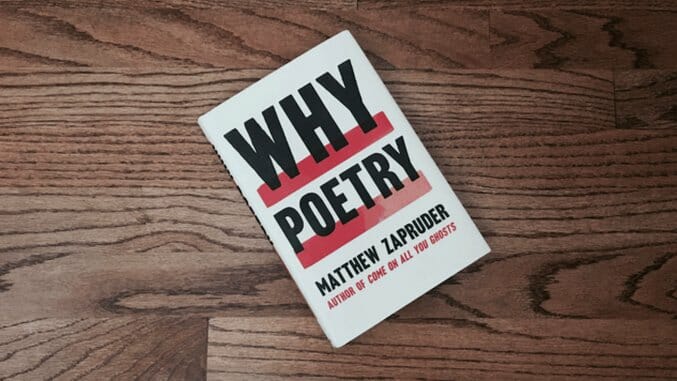Why Read Poetry? Because It Can Make You More Empathetic

One upon a time, people did not have to ask the question, “Why poetry?” Poetry required no apologia, no formal training, no elitist ivory tower education. Poetry simply was. It was read, recited, written; taught, learned, remembered. All without fanfare or leeches or ceremonies with strange men in carnival masks and opera cloaks like those dudes in that one Stanley Kubrick film.
That was a long time ago, in places like Greece and Ireland. In the contemporary U.S., we not only have to ask this question, but to answer it repeatedly and in book-length fashion.
The man answering this question at the moment is Matthew Zapruder in a new book, Why Poetry.
Zapruder and I have a few things in common, almost none of which are stylistic and none of which we’ve ever discussed. We both took Russian in quite possibly the same dingy corner of UC Berkeley’s Dwinelle Hall. We both spent a lot of time contemplating the “Called Back” inscription on Emily Dickinson’s grave marker in Amherst, Massachusetts. We both grew up with attorney fathers who were likely to nod off during readings, and who were prideful (and doubtful) over the choice to pursue poetry as…a vocation? An identity? A force? My own father’s poet-bromance has been with Robert Pinsky, a man who has tirelessly worked to do the same thing Zapruder’s book seeks to do-which is to say, Make Poetry Normal Again.
So I guess the big question is, “Does Zapruder’s book accomplish that?”
Well, here’s the thing: poetry suffers from something I call “Solipsistic Feedback Loop Syndrome.” This means that the people reading poetry tend to be other poets. And since the people likely to pick up a book about poetry are people who are already interested in it, those people might not find a ton of new information in Why Poetry.
But if you are a novice—rather, if you are under the misimpression that you are a novice to poetry—Zapruder’s book has much to recommend it. It’s not a sweeping pronouncement upon the state of the art form, nor is it a didactic foray into how to analyze poems or a chronology of influential poets. It’s personal. It’s one guy’s story about stumbling onto this discipline and pondering what makes it meaningful to him, and it invites others to consider that they might find meaning in it, too.
Even for people who already eat poetry three times a day, Why Poetry still offers a refreshingly convivial discussion of poetry’s purpose in a world where it’s too often made to seem like public therapy or pointless frippery. Yet if you visit the Poetry Foundation website, you will see a diatribe against Zapruder by another poet—and Zapruder’s response. It appears that even mild-mannered assertions like “poetry should be read more” and “if poems seem impenetrable and obfuscated and impossible to read, it’s possible that they’re actually just not well-written” can arouse the ire of one’s peers. Yet Zapruder succeeds in giving space to the question of whether poetry has any real-world usefulness or power. The answer, as seems to be the answer to most things, is “yes and no.”
Maybe, Zapruder argues (and I’d have his back on this), poetry can make you smarter, more interesting, more discerning and expansive. Can poetry save the world? Let’s put it this way: It won’t be what kills us off. And yeah, maybe it can.
To be honest, I wish there were no need for books like this one. It was normal to read poetry at my house when I was a kid; we just did it. Apparently most people do not, and they grow up alienated from it. Why does that matter?
Because poetry can be beautiful.
Because it can, somehow, bypass an analytic brain and interface directly with the heart.
Because it encourages you to look at things through another, often nonliteral, lens, and this is crucial. The more you learn to look at one thing and see another, the less capable you are of intellectual or ethical or moral rigidity. Zapruder quotes a comment of Robert Frost’s that I love. Frost said that if a person is not fluent in metaphor, “…you are not safe anywhere. Because you are not at ease with figurative values…you are not safe in science. You are not safe in history.” People who soak in metaphor regularly are very unlikely to be bigots. They aren’t wired for it. They are instinctively inclined to understand that things are like other things and that people are like other people. Once that is a default assumption, there isn’t a ton of room for rigid cleaving to binaries that do not exist in nature.
Why poetry?
I mean, why not?
Amy Glynn is a poet, essayist and fiction writer who really likes that you can multi-task by reviewing television and glasses of Cabernet simultaneously. She lives in the San Francisco Bay Area.







































